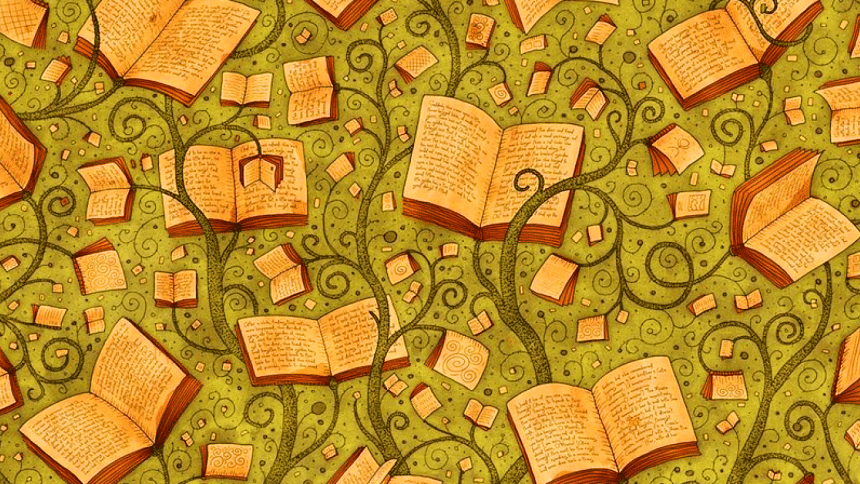The old man and the labyrinth of books

But what do you gain by giving? It teetered, the question, like a teacup on legs performing a balancing act, on the tip of my tongue, but—to my credit, to my utmost credit—I did not say it. Instead, I asked, gesturing to the brilliantly untidy pile of books, "Why give these away? And at so low a price?"
The lips move against teeth, yellowed and mottled by tooth worms and time to mirror, in that vague, metaphorical way, the pages of his books. Wordsworth classics, 20th-century editions, dusty and smelly, dirty and dirt-cheap. Just the way I like it. The lips are still moving, partially covered by a wool of moustache, telling me about "the go-down where my men discovered stacks of old books that no one realised had been there for perhaps over a decade when we were about to shift stores." I think about an anchor, breaking the surface of the ocean like a spoon against the caramel crust of crème brûlée, sinking deeper into its blue folds until it snags against the rusted, iron handle of a treasure chest, and causing, in its struggle to wrestle free, the ocean to shudder in an almighty groan of "Treasure, treasure, treas-argh..." He speaks about dead-ends and waste, about "my books may be old but what's a second-hand, a third-hand to a reader, right?" He shifts in a gesture of both prevarication and challenge, repeats again, "Right?" And I hear again the dull thunder of anchor against water-softened wood.
The Dostoevsky is a 100, "Les Miserable" is 200, the little boy can get 20 off from his "Diary of a Wimpy Kid", and here are your Henry Jameses, your Chekhov Omnibus, your Wilde plays, all a 100 apiece. I wonder, as I struggle under the tomes of leftovers, if this man knows what he has done. I fork over BDT 2,000, moistened certainly by the sweaty exertion of flitting from bookstore to bookstore under budgeted time. It is not enough—I have 12 books, a number of which glisten unopened under their transparent book covers, and a wimpy kid to pay for. But he accepts it gratefully, offers me a card.
My father's sagely advice of "look for the biggest, brightest store" had presided over my excursion. In an unordinary gesture of daughterly dutifulness, I had dashed to a store which boasted air conditioning with its shiny, opaque doors. My book list was duly returned unravaged by ink stains. "Try that one", they said. I already had; too pricey. What about… no, they only sell textbooks. Maghrib ajan resounded, signalling the fall of evening. The stores at New Market would close soon but I would give this one last try.
It was the old man who cajoled me into his hole-in-the-wall. It was that unassuming tilt of his head; he seemed as satisfied to seduce me of my pennies with the old ink smell of his shop as he was to offer me a cup of tea and a conversation.
It is the strangest bookstore I have ever been to. The shelves, long and narrow as a river laid to rest on a patch of earth, produces an uncannily proper feeling of humility in one. Dust motes settled on every surface, books clustered together wherever one assigned a glance. The careless fashion of the arrangement of bookshelves, the easy confidence with which the old man and his older right-hand man sifted through titles were a sight of fascination. I disbanded my book list soon after, now having had my voracious appetite whet with the seductive glimpses of novels I had not had the foresight to include.
He bids me farewell, only after retrieving promises of my return. On the way back home, reminded of the old man's kindness, a half-full tin of Pringles is donated to three sisters. I retrieve the card, learning its name only now in the flickering headlights of passing cars. If I had hoped for a more inspired name, then I am strangely not disappointed. "Book View", it reads, "shifting to a wider place."
My father asks if I wish to return next weekend. I do, I say. After all, I owe the old man a good 100, still.
Nuzhat Biswas is the oft-curious hyphen betwixt an incurable humanist.

 For all latest news, follow The Daily Star's Google News channel.
For all latest news, follow The Daily Star's Google News channel. 



Comments